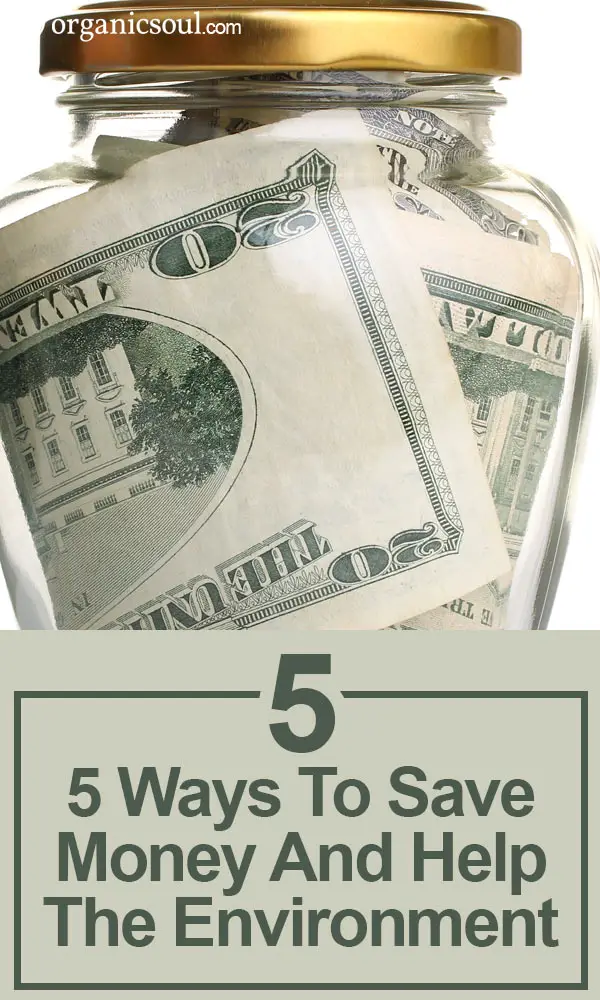
Looking for a quick, simple, and straightforward way to save money and help the environment? Look no further. In this bullet point style guide, we’ve brought together some of the best ways to save money and help the environment. Some of this will be familiar, but that doesn’t mean it’s not worth a second read!
Like Organic Soul on Facebook
1. Get A Green Home
- Set your thermostat to a timer. Be sure it isn’t running during the day when no one is home!
- Here’s a no brainer: fix and seal both water leaks and leaks in windows!
- Next time you upgrade your appliances, go for energy efficient alternatives.
- Cut down your use of lights, heaters, and computers. Anything that can be turned off, should be, especially when you’re not using it or not in the room!
Moral: Being energy efficient means saving money on utility bills, replacing lights, and other replacement costs.
2. Eat Efficient But Still Eat Happy
- First, consider starting an organic garden. The money you save on food will offset the money needed for start-up.
- Eat more veggies and less meat. They’re cheaper, healthier, and decreases demand for a environmentally unsound industry.
- Purchase smaller sized portions. Most restaurants offer half size or some variation of their main meals. Instead of wasting food and money, just go for the smaller size and eat every bit.
- Plan out your meals! When you plan out your eating schedule and meals, you become more secure in your financial planning as well. Aim at spending $5 a day on food – you can do it!
Moral: Food is something we’ve got to deal with everyday. That being so, don’t just “wing it” and instead try to put time and thought into where you’re eating, how you’re eating, and how much you’re paying to eat! Remember: as a consumer, you create demand. The more efficient you eat, the better the message you send to businesses.
3.Transportation
- Carpool! Meet some friends in the office if you haven’t already and take turns driving to work. This is 1) fun, because you get to talk to coworkers in the morning, 2) efficient, because you don’t have spend as much money on gas, and 3) healthy, because it’s prudent to get to know other people you work with. Try it out!
- Public transit is another option. Take the bus, train, or rail car to work next time and try to develop a unique route. This is much cheaper than gas costs and I like to think of it as a series of mini adventures!
- Bike, walk, or whatever! Yes, another option is to drop auto altogether. Get some exercise, prevent your contribution to pollution, and save money (on health bills and fuel costs).
Moral: It’s easy to get to point A to B, and you can save money while you’re doing it. The benefits are clear for both you and the environment.
4. Use Natural Resources
- Open your windows/blinds to let in sunshine to heat your home. The natural light is beautiful and it is a cheap, effective way of warming.
- Set up a water reservoir/rain catcher to irrigate into your organic garden. These are simply to install and can help some hundreds a year in water costs.
- Hang your clothes out to dry instead of using the dryer. It make take a bit longer, but it will save you bundles in energy costs.
- With your food waste, lawn trimmings, and other assorted mulch like material, start a compost bin. You’ll be able to use this in your garden to help you get the richest, f
 reshest vegetables.
reshest vegetables.
Moral: You’ve got tons of free resources and energy all around you, so use them! If you’re really serious, consider having a small windmill installed or some solar panels. These come at their own cost, but are great for future energy investment.
5. Replace The One-Time Uses
- Get a reusable water bottle, a reusable bag or two, and reusable food containers. Sounds like old news, I know, but the fact that still so much money is wasted on new containers only to end up in the garbage dump is too disconcerting not to say it again.
Moral: One-time use anything is disproportionately expensive. Instead, buy reusables and cut down on waste, money spent, and energy put into buying new things!
















